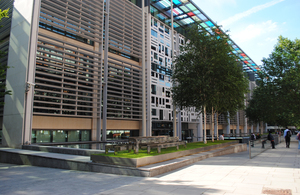Support for rough sleepers while tackling antisocial behaviour
Rough sleepers will be offered greater support as the government takes action to support the most vulnerable while still tackling antisocial behaviour.

Through amendments to the Criminal Justice Bill, new measures will ensure rough sleepers are directed to the support available to help get them off the streets - for example to a place to sleep or addiction treatment.
New guidance will make clear that police and local authorities must prioritise directing people who are sleeping rough to support services before they consider using criminal sanctions. This will include directing people where to go to access health services or shelters.
If, despite being directed to support services and given a warning, people continue to cause antisocial behaviour, such as damage or harassment, they will be required to stop and asked to move on with a rough sleeping notice.
Home Secretary James Cleverly said:
This government is committed to ending rough sleeping. To achieve this, we must take a multi-faceted approach that supports vulnerable people off the streets and ensures everyone can feel safe in our neighbourhoods and communities.
We are scrapping the outdated Vagrancy Act and replacing it with new measures that focus on supporting people, while ensuring the police and local authorities are able to address behaviour that makes the public feel unsafe.
This government listens, and we have worked hard to ensure these proposals prioritise helping vulnerable individuals, whilst ensuring communities are safer and better protected.
Policing Minister Chris Philp said:
Ending rough sleeping is a key priority for the government and is why we have a plan to tackle the root causes of why people end up on the streets, backed by an unprecedented £2.4 billion.
Nobody should be criminalised for having nowhere to live, but as we have always said, we will not accept behaviour that is antisocial or intimidating to the public, such as rough sleeping in a way that blocks a local business or fire escape.
I want to thank Bob Blackman MP and Nickie Aiken MP for their dedication and cooperation on this issue. We have listened carefully to the proposals and have worked constructively to ensure they are proportionate, properly targeted, and ensure vulnerable people are directed towards support while protecting communities from antisocial behaviour.
Alongside new measures in the Criminal Justice Bill, the Vagrancy Act will also be scrapped, which wrongly criminalises people for sleeping rough, while still criminalising behaviour that is antisocial or intimidating.
Through the new bill, if an individual is causing antisocial behaviour or intimating others, they could be served with a notice that could require them to stop the behaviour or move on.
Ignoring such a notice, without a reasonable excuse, could be a criminal offence and escalated to a court order containing further requirements, such as attending drug treatment.
The government will also remove references to odours in the bill. This will clarify that previous references to ‘smells’, which had been intended to tackle rubbish dumped or human waste, were never intended to wrongly criminalise anyone for not being able to wash.
This is part of the government’s wider work to tackle homelessness and end rough sleeping for good backed by a £2.4 billion investment over three years which includes tailored support for vulnerable people. Since 2018, more than 740,000 households have been prevented from becoming homeless or supported into settled accommodation.
The rough sleeping and nuisance begging provisions, together with the repeal of the Vagrancy Act 1824, will come into force 3 months after the Criminal Justice Bill receives royal assent, allowing for local authorities and police to have appropriate time to work with communities and charities to understand and implement the new laws.